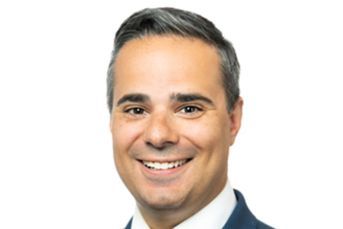Advisors dig into the great commodity question
 Michael Nakanishi of Kingswood US and Brian Hartmann of Granite Bridge Wealth Management
Michael Nakanishi of Kingswood US and Brian Hartmann of Granite Bridge Wealth Management
'Investors interested in long-term exposure to a commodity may be better served investing in the equities of companies with exposure to the commodity,' one advisor says.
The question of whether gold, oil and other commodities are right for individual client portfolios has always been a hard one for financial advisors to mine. So let’s dig into it.
The Invesco DB Commodity Index Tracking Fund is flat year to date as inflation has moderated over the course of 2023 thanks to the Federal Reserve’s aggressive rate hike campaign. That said, over the past five years, the fund is up almost 50% as a result of the step-up in inflation caused in part by the pandemic. The fund uses futures contracts to invest in light sweet crude oil, heating oil, gasoline, natural gas, Brent crude, gold, silver, aluminum, zinc, copper, corn, wheat, soybeans and sugar.
In other words, it’s the hard stuff, and generally the type of asset that financial advisors view as different from plain vanilla stocks and bonds. A macro trade, if you will, and not meant for plain vanilla client portfolios.
But Robert Minter, director of ETF investment strategy at abrdn, doesn’t believe that’s the case. He argues for commodities as a perfectly acceptable part of individual investor portfolios.
“Commodities can go higher or lower based off of both demand and supply. And right now we have a supply problem. Over the last three years, we’ve had a supply problem. And so we need to focus a little less on the macro, a little more on the supply problem,” Minter said.
Brian Hartmann, partner at Granite Bridge Wealth Management, agrees with Minter and adds a healthy amount of exposure to commodities to client portfolios in almost all market cycles.
“Our advisors take the time to educate our clients on how commodities may help balance their holdings and myth-bust some of the misconceptions that are commonly associated with owning this asset class,” he said.
For example, Hartmann said that investors often believe gold is a reliable hedge against stock market volatility, when in most cases it is better used as a hedge against inflation and the value of the U.S. dollar. For the record, gold is up 6% so far in 2023 and up almost 60% over the past five years.
Robert Pearl, co-founder and wealth advisor at G&P Financial, uses commodities tactically in client portfolios. In the past, he’s used gold and broad commodity ETFs as inflationary hedges. Currently, he’s reducing his exposure to hard assets due to deflationary pressures.
“If prices of gold begin to come down and the U.S. economy has a mild recession, then I couldn’t imagine commodity baskets performing well in an environment like that,” he said.
Similarly, Michael Nakanishi, financial advisor at Kingswood US, uses commodity ETFs for clients who are open to the risks associated with commodities. In fact, he’s had exposure to oil and gas since 2021.
“While I’ve started to trim that, two wars in oil-producing regions as well as global, especially domestic, increasing energy needs, provide compelling reasons for a continuing hold,” Nakanishi said.
NOT DIGGING IT AT ALL
On the other side of the debate, advisors such as Josh Strange from Good Life NOVA prefer not to add commodity exposure to client portfolios. Why? Well, in Strange’s opinion, commodities are an “extremely volatile asset class.”
“Gold has not held up particularly well in the recent inflationary period and really only seems to rally in times of extreme fear about existential crises,” he said.
Similarly, Ted Haley, president of Advanced Wealth Management, said that unless a client has a particular interest in adding gold, oil or agricultural products to their portfolios, he generally won’t do it, calling it “speculation rather than investing.” Haley said he would rather invest in profitable and innovative companies when making specific investment choices.
Not that he hasn’t explored the idea of investing in commodities.
“We have considered using commodity managers, but as with most actively managed investments, it is challenging to find managers or strategies that consistently have competitive performance,” Haley said.
Likewise, Jonathan Swanburg of TSA Wealth Management avoids putting commodities in client portfolios because of poor performance because they “tend to be expensive, and tax-inefficient.”
“Investors interested in long-term exposure to a commodity may be better served investing in the equities of companies with exposure to the commodity rather than the commodity itself,” Swanburg said.
If those aren’t enough reasons for why a large contingent of advisors regularly steer clear of commodities, Scott Bishop of Presidio Wealth Planners has a few more.
“If you own an ETF or ETN that invests in futures contracts inside an IRA, you will many times get a K-1 that may include unrealized business taxable income. Also, when you invest through futures contracts for a longer-term hold, you have the roll-risk, where the pricing may be different when a contract expires and you go to the next month,” Bishop said.
“Commodities do not pay a dividend,” he added. “So if you are wrong on the price move, there is no other income.”
So there’s that, too.
Is now the perfect time for a contrarian play on Chinese stocks?
Learn more about reprints and licensing for this article.








